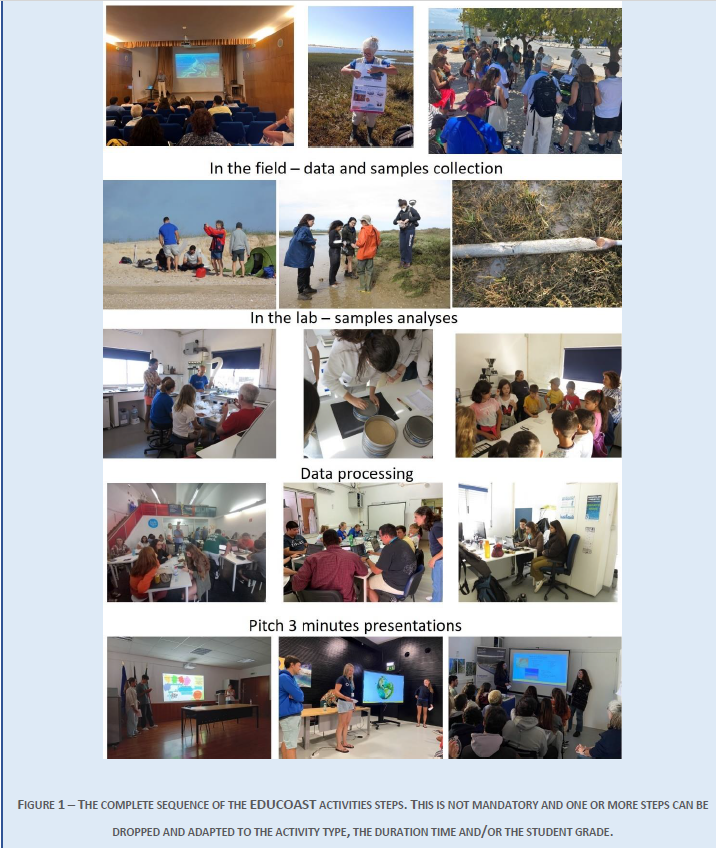More information
Description
Experimental and field-based learning provides a variety of experiences that cannot be acquired in the typical classroom setting, especially in the field of natural sciences. The EDUCOAST project aims to promote nature-based education in the area of coastal and marine geosciences and will take advantage of the facilities of IPMA''s Station in Tavira, Algarve. This station is located in the Ria Formosa, a unique coastal setting including dunes, saltmarshes, a lagoon, sand barriers and beaches, and has a newly well-equipped research lab “Tavira EMSO-PT Centre” (funded by the Portuguese Roadmap of research infrastructures) for sediment study (in the sedimentology area). This project will provide researchers, educators and students with an inspiring space to learn about coastal and marine processes. EDUCOAST includes a set of activities concerning the preservation and protection of the environment particularly focusing on the importance and sustainability of the coastal systems using the Ria Formosa as an example. It includes training sessions targetting a wide range of participants, 1) elementary and secondary school students, 2) undergraduate students, 3) postgraduate students, 4) local charity organisations, 5) maritime-touristic companies, 6) secondary school teachers, and 7) graduate level summer school students.
The project will also be an opportunity to foster competitiveness between the Portuguese Blue Growth companies and to enhance the performance of Portuguese research organizations. Alongside the Portuguese Institute of the Sea and Atmosphere, I.P. (promoter), the project partners are the Faculty of Sciences of the University of Lisbon - which will be dedicated to the development of the curricula and higher education teaching expertise, the Tavira Ciência Viva Centre - contributing with its experience in outreach communication and the Portuguese Environment Agency, I.P. - providing the needed consultancy regarding coastal resilience and protection.
Summary of project results
The development of practical skills, the ability to tackle real-world challenges, and the understanding of how theoretical concepts manifest themselves in real field conditions is a key issue in geoscience training and practice. EDUCOAST aimed to develop new educational and training opportunities by establishing a unique outdoor educational “laboratory” facility, extending upon the current applications of IPMA’s research-oriented field station in Tavira.
Training was developed using a ''hands-on'' approach, where activities typically included some short introductory lectures, a field trip to the Ria Formosa environments (salt marsh, barrier island, lagoon) with sampling, data collection, followed by laboratory work/sample analysis and data processing (Figure 1).
This sequence was the basis for the School Visits (ATI#3), where the IPMA field station hosted over 1000 students, and for the Academic Training (AT#4), where 8 undergraduate internships and 2 Master''s thesis were carried out. It also included 2 internships of 4 days each on "Coastal Geodynamics and Ecology - Hands on" in February 2023 and 2024.
In addition, four training sessions entitled "Coastal Zones: A Changing World" for primary and secondary school teachers (ATI#5) were held in July 2022, April and July 2023 and April 2024
There was also a short training course for the marine tourism sector (ATI#6) on "The Geodiversity of the Ria Formosa", covering topics such as the origin and evolution of the Ria Formosa, the services provided by the barrier islands and the importance of the salt marsh, among others.
The ATI#7 activity included two summer schools, held in September 2022 and 2023 respectively. The first, in collaboration with FCUL''s Dom Luiz Institute, was entitled "Land-Atmosphere-Ocean interactions in a changing planet - a hands-on approach to Earth system observation and modelling". The second, promoted only by EDUCOAST project, was entitled "Coastal Geosystem Services - the Ria Formosa case study".
In general, the global of the all activities were highly rated by the students. Finally, an outreach and awareness component (ATI#8) was dedicated to the general public throughout the project. In total, the project involved about 2470 participants.
The EDUCOAST "hands-on" experience helped students to develop and acquire generic competences such as autonomous learning, critical thinking and communication skills, and laid the foundations for future nature-based activities.
